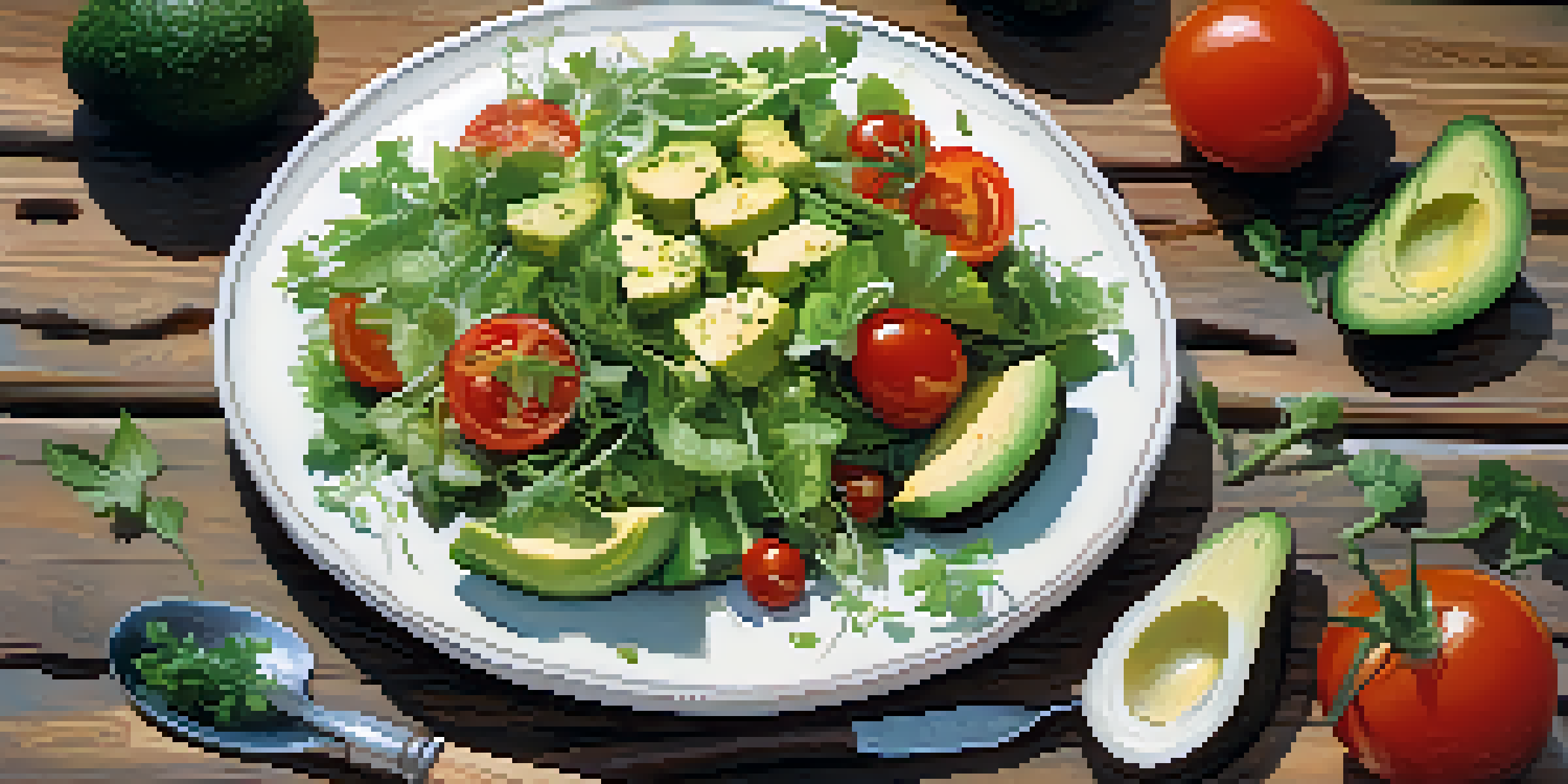Exploring Different Vegetarian Diets: Find What Works for You

Understanding the Basics: What is a Vegetarian Diet?
A vegetarian diet primarily consists of plant-based foods, but it can vary significantly in its restrictions. At its core, it excludes meat, poultry, and fish, but many variations exist. This diversity allows individuals to choose a dietary style that aligns with their health goals, ethical beliefs, or environmental concerns.
The food you eat can either be the safest and most powerful form of medicine or the slowest form of poison.
For instance, some vegetarians, known as lacto-vegetarians, include dairy products, while others, called ovo-vegetarians, consume eggs. Understanding these distinctions is essential as they can impact nutrient intake. It’s about finding a balance that works for your lifestyle and body.
Ultimately, the best vegetarian diet is one that not only meets your nutritional needs but also keeps you satisfied and energized. Exploring the various types can help you identify which path resonates with you.
Lacto-Vegetarian: Dairy Delight in Your Meals
Lacto-vegetarians include dairy products like milk, cheese, and yogurt in their meals, allowing for a rich source of calcium and protein. This flexibility makes it easier to incorporate traditional recipes while sticking to a vegetarian lifestyle. For example, a creamy lasagna or a refreshing yogurt parfait can easily fit into this diet.

If you're considering this option, it’s important to choose high-quality dairy products to maximize health benefits. Many people find that dairy can enhance flavors and textures in their meals, making it a satisfying choice. However, be mindful of lactose intolerance, which affects a significant portion of the population.
Variety in Vegetarian Diets
Vegetarian diets come in various forms, such as lacto, ovo, and flexitarian, allowing individuals to choose based on personal health and ethical beliefs.
Incorporating a variety of dairy products can also help prevent boredom in your meals, keeping your diet diverse and enjoyable. Whether it's a cheesy pizza or a hearty quiche, the possibilities are endless!
Ovo-Vegetarian: Eggs on Your Plate
Ovo-vegetarians enjoy eggs, adding a fantastic source of protein and essential nutrients to their diets. Eggs are incredibly versatile and can be used in numerous dishes, from breakfast scrambles to baked goods. This diet can be particularly appealing for those who want more protein without relying on meat.
Eating together is a form of intimacy, one that begins with shared food and ends with shared stories.
Many find that eggs also offer a satisfying texture and flavor to meals. For instance, a fluffy omelet filled with vegetables can be a nutritious start to the day, while a classic quiche provides a hearty option for lunch or dinner. The inclusion of eggs makes it easier to create balanced meals.
However, it’s essential to source eggs from humane and sustainable farms whenever possible. This choice not only supports animal welfare but often results in better-tasting eggs. So, if you love eggs, this option might be the perfect fit for you!
Flexitarian: The Best of Both Worlds
A flexitarian diet is a flexible approach that emphasizes plant-based foods while allowing for occasional meat and fish consumption. This style is ideal for those who want to reduce their meat intake without fully committing to a vegetarian lifestyle. Picture a hearty salad topped with grilled chicken – it’s a great way to enjoy both worlds.
Flexitarians can benefit from increased nutrient diversity, as they can freely mix and match plant and animal sources. This approach also helps ease the transition for those considering a full vegetarian diet. Ultimately, it encourages mindful eating habits and promotes a healthier lifestyle without strict restrictions.
Nutritional Considerations
Different vegetarian diets require careful planning to ensure sufficient nutrient intake, particularly for vitamins and minerals typically found in animal products.
Moreover, it provides the freedom to enjoy social situations without feeling left out. A dinner party with a meat dish? No problem! You can still indulge while sticking to your dietary preferences.
Vegan: A Plant-Only Approach
A vegan diet excludes all animal products, including meat, dairy, and eggs. This lifestyle goes beyond dietary choices, often reflecting a commitment to ethical and environmental concerns. By focusing solely on plant-based foods, vegans can experience a vibrant array of fruits, vegetables, grains, and legumes.
Transitioning to a vegan diet can initially seem daunting, but with the right resources and recipes, it can be both enjoyable and fulfilling. Think of all the creative ways to use ingredients like chickpeas, quinoa, and nuts to create delicious meals. For instance, a chickpea salad sandwich can be a hearty lunch option.
However, vegans need to be mindful of their nutrient intake, particularly vitamin B12, iron, and omega-3 fatty acids. By planning meals wisely and incorporating fortified foods or supplements, one can thrive on a vegan diet. It’s all about making informed choices.
Raw Vegan: The Ultimate Fresh Food Experience
The raw vegan diet takes plant-based eating a step further by emphasizing uncooked and unprocessed foods. This approach is based on the belief that raw foods retain more nutrients and enzymes, promoting better digestion and overall health. Imagine a colorful array of salads, smoothies, and dehydrated snacks – it’s all about freshness!
Transitioning to this lifestyle can bring about a newfound appreciation for the natural flavors of fruits and vegetables. Many raw vegans enjoy experimenting with creative recipes, such as zucchini noodles or raw desserts, showcasing the versatility of uncooked ingredients. This can make meals not only healthy but also visually stunning.
Explore and Experiment
Finding the right vegetarian diet involves exploration and experimentation, enabling individuals to discover what works best for their lifestyle and preferences.
However, it's essential to ensure you're getting enough calories and nutrients, as the restricted food options can lead to deficiencies if not managed properly. A well-planned raw vegan diet can be incredibly rewarding, but it requires a bit of dedication and creativity.
Pescatarian: Seafood Lovers Unite
The pescatarian diet includes fish and seafood, making it a great option for those who want to enjoy the benefits of a vegetarian diet while still incorporating animal protein. This approach provides a wealth of omega-3 fatty acids, which are essential for heart health and brain function. Think of grilled salmon with a side of roasted vegetables – a delicious and nutritious meal!
Pescatarians can experiment with various types of seafood, from shrimp to tuna, allowing for a diverse range of flavors and textures. Many find this diet easier to adopt, as it still offers the option of consuming animal products without the full meat commitment. This flexibility can make social dining experiences more enjoyable.

However, it’s crucial to choose sustainable seafood options to minimize the environmental impact. By being mindful of your choices, you can enjoy the best of both worlds while contributing positively to the planet.
Finding Your Fit: Tips for Choosing a Vegetarian Diet
With so many vegetarian options available, finding the right fit for you can feel overwhelming. Start by reflecting on your personal goals: Do you want to improve your health, support animal welfare, or reduce your environmental footprint? Understanding your motivations can help narrow down your choices.
Next, consider your lifestyle and food preferences. Are you a fan of dairy or eggs? Do you love experimenting with new plant-based recipes? Assessing your eating habits can lead you to the diet that feels most natural and enjoyable. Remember, it’s all about balance and sustainability.
Lastly, don’t hesitate to experiment! Trying out different vegetarian diets for a week or two can provide valuable insights into what works best for you. Embrace the journey of discovery, and enjoy the delicious possibilities that a vegetarian diet has to offer!